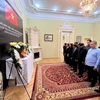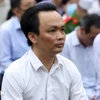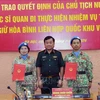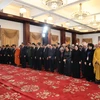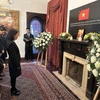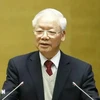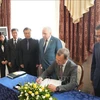By the end of 2013, 15.8 million households in the country’s rural areas, equivalent to 96.7 percent of rural households, had access to power, signaling the success of the national rural electrification programme started in 1998.
The programme has played its part in developing the country and reducing poverty, said Minister of Industry and Trade Vu Huy Hoang at an online review conference on April 26.
The first project of the programme, called the rural energy project, cost over 3.2 trillion VND (150.4 million USD), of which 150 million USD had been borrowed from the World Bank. It has benefited 976 rural communes housing 550,000 households.
According to Electricity of Vietnam (EVN), which has undertaken the programme until now, official development assistance coming from international donors was decisive in the success of the programme.
In the reviewed period, nearly 48 trillion VND (2.25 billion USD) has been pumped into the programme, which has also brought power to remote and extremely disadvantaged areas, including border areas and islands, EVN reported.
EVN Chairman Hoang Quoc Vuong commented that the programme has contributed to giving rural areas a new facelift and facilitating the development of agriculture and its services and the processing industry.
He referred to a 6.6 fold-rise in agriculture production value in 1998-2013 as proof of the success.
Victoria Kwakwa, World Bank Country Director, said many countries were interested in the success story of Vietnam’s rural electrification programme.
She pledged that her institution will continue aiding the country through the supply of investment destined for infrastructure in the 2014-2020 period.
Addressing the conference, Deputy Prime Minister Hoang Trung Hai confirmed that the programme in the 1998-2013 was successful on the back of strong support from the entire political system and local people.
The country is embarking on a national energy development programme to 2020 and beyond to be sufficient in power.
It is set to connect over 98 percent of its population to the national grid by 2015 and expects all rural residents to be using power by 2020.
In the meantime, the country is suffering an energy shortage, with each person consuming an average 1,200 kWh a year.
According to the Ministry of Industry and Trade, the rural electrification progamme is looking towards supplying power for 12,000 villages and hamlets and improving the rural power transmission lines, which will benefit around 7 million households.
The tasks require around 80 trillion VND (3.76 billion USD), the ministry said.-VNA
The programme has played its part in developing the country and reducing poverty, said Minister of Industry and Trade Vu Huy Hoang at an online review conference on April 26.
The first project of the programme, called the rural energy project, cost over 3.2 trillion VND (150.4 million USD), of which 150 million USD had been borrowed from the World Bank. It has benefited 976 rural communes housing 550,000 households.
According to Electricity of Vietnam (EVN), which has undertaken the programme until now, official development assistance coming from international donors was decisive in the success of the programme.
In the reviewed period, nearly 48 trillion VND (2.25 billion USD) has been pumped into the programme, which has also brought power to remote and extremely disadvantaged areas, including border areas and islands, EVN reported.
EVN Chairman Hoang Quoc Vuong commented that the programme has contributed to giving rural areas a new facelift and facilitating the development of agriculture and its services and the processing industry.
He referred to a 6.6 fold-rise in agriculture production value in 1998-2013 as proof of the success.
Victoria Kwakwa, World Bank Country Director, said many countries were interested in the success story of Vietnam’s rural electrification programme.
She pledged that her institution will continue aiding the country through the supply of investment destined for infrastructure in the 2014-2020 period.
Addressing the conference, Deputy Prime Minister Hoang Trung Hai confirmed that the programme in the 1998-2013 was successful on the back of strong support from the entire political system and local people.
The country is embarking on a national energy development programme to 2020 and beyond to be sufficient in power.
It is set to connect over 98 percent of its population to the national grid by 2015 and expects all rural residents to be using power by 2020.
In the meantime, the country is suffering an energy shortage, with each person consuming an average 1,200 kWh a year.
According to the Ministry of Industry and Trade, the rural electrification progamme is looking towards supplying power for 12,000 villages and hamlets and improving the rural power transmission lines, which will benefit around 7 million households.
The tasks require around 80 trillion VND (3.76 billion USD), the ministry said.-VNA



